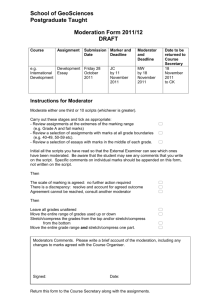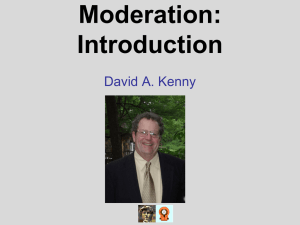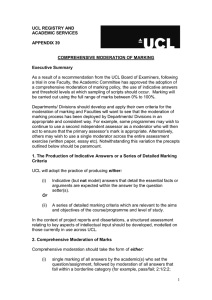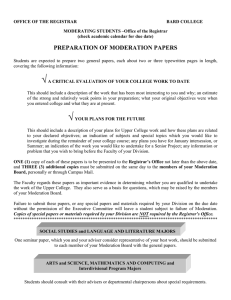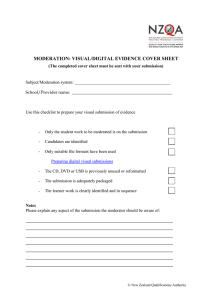Internal Moderation Policy
advertisement
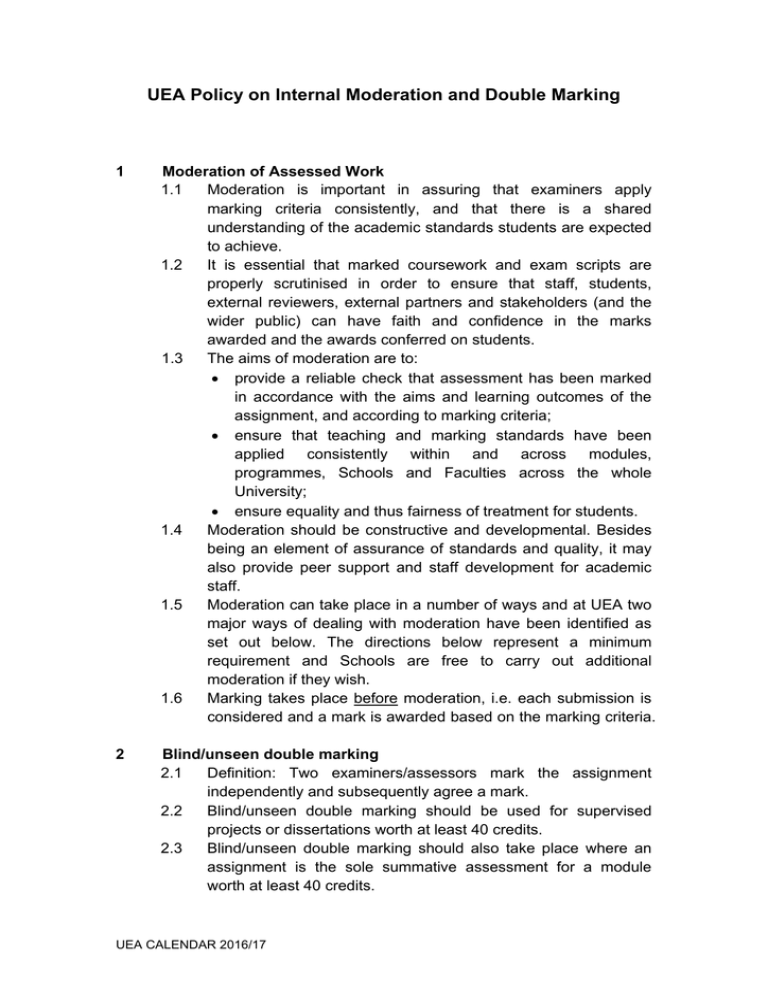
UEA Policy on Internal Moderation and Double Marking 1 Moderation of Assessed Work 1.1 Moderation is important in assuring that examiners apply marking criteria consistently, and that there is a shared understanding of the academic standards students are expected to achieve. 1.2 It is essential that marked coursework and exam scripts are properly scrutinised in order to ensure that staff, students, external reviewers, external partners and stakeholders (and the wider public) can have faith and confidence in the marks awarded and the awards conferred on students. 1.3 The aims of moderation are to: provide a reliable check that assessment has been marked in accordance with the aims and learning outcomes of the assignment, and according to marking criteria; ensure that teaching and marking standards have been applied consistently within and across modules, programmes, Schools and Faculties across the whole University; ensure equality and thus fairness of treatment for students. 1.4 Moderation should be constructive and developmental. Besides being an element of assurance of standards and quality, it may also provide peer support and staff development for academic staff. 1.5 Moderation can take place in a number of ways and at UEA two major ways of dealing with moderation have been identified as set out below. The directions below represent a minimum requirement and Schools are free to carry out additional moderation if they wish. 1.6 Marking takes place before moderation, i.e. each submission is considered and a mark is awarded based on the marking criteria. 2 Blind/unseen double marking 2.1 Definition: Two examiners/assessors mark the assignment independently and subsequently agree a mark. 2.2 Blind/unseen double marking should be used for supervised projects or dissertations worth at least 40 credits. 2.3 Blind/unseen double marking should also take place where an assignment is the sole summative assessment for a module worth at least 40 credits. UEA CALENDAR 2016/17 2.4 2.5 2.6 2.7 2.8 2.9 2.10 Summative presentations/oral examinations which are worth more than 10% of the module assessment weighting should be double marked (by means of two markers attending the presentation/oral examination) or recorded 1 for purposes of moderation and/or remarking as necessary. Where a station/item for an assessment by an Objective Structured Clinical Examination (OSCE) or Objective Structured Practical Examination (OSPE) is double marked (i.e. two assessors are present at the station), further moderation is not required. Where a station/item for an assessment by an Objective Structured Clinical Examination (OSCE) or Objective Structured Practical Examination (OSPE) is assessed by a single marker, a suitable moderation process should be in place; for example: identified individuals appointed to oversee and observe the assessment practice across a sample of stations and assessors; video or sound recording 2 of a sample of stations for later review; post-assessment analysis of assessor behaviour using relevant data. Summative assessment of Work-based learning (practice assessment): Where student performance is measured in the workplace, assessor behaviour will be triangulated using a range of methods of data capture. Copies of each submission are marked ‘blind’ or ‘unseen’ by two or more independent markers. If markers disagree, they can change/alter marks on an individual submission. If the markers cannot agree, an appropriate third party will adjudicate. The adjudicator should be an appropriate office holder within the School, for example: Chair of the Board of Examiners School Director of Learning and Teaching Assessment coordinator/lead or equivalent position Adjudication duties may be shared so that the same person does not have to oversee every case within a School or within a module. The adjudicator considers the ‘case’, rather than the script. The adjudicator should consider the marks and comments of the two markers, and take advice from a third party as needed in order to determine the final mark for the assignment. 1 2 Please note: students must consent to any recording. Please note: students must consent to any recording. UEA CALENDAR 2016/17 2.11 2.12 2.13 The method by which an agreed mark is arrived at should be recorded and should be transparent. Where work has been double marked as set out above further moderation is not required. Where work has been double marked as set out above a student is not eligible to apply for a remark or to appeal the mark (though a student may be eligible to submit an appeal relating to the assignment on other grounds, for example, inadequate supervision of a project). 3 Examinations 3.1 Schools must choose how to manage the marking process with regard to examinations by adopting A or B below: A Blind double mark scripts where a sufficient marking resource is available B Moderate a sample of scripts in line with the Moderation Policy 3.2 Schools should communicate to students the method pertaining to the Exam(s) in question. 4 Internal moderation 4.1 The module organiser shall be responsible for ensuring that moderation is carried out.3 4.2 Assessed work (including reassessed work) at levels 3 (Foundation year level), 4, 5, 6 and 7 that has not been double marked should be moderated (i.e. should have the marking process checked) by means of reviewing samples as follows: at least one item of assessment for each module all assignments which contributes at least 30% to the overall module mark if there are a large number of markers in the pool (4 or more) then moderation should be required regardless of the percentage weighting of the assessment item assessment tasks marked by new or less experienced markers (i.e., those with less than 2 years’ experience of marking in HE setting) where concerns or issues have been raised through quality assurance processes or professional body requirements. Issues may include, but are not restricted to: 3 In other circumstances a suitable alternative person shall be responsible (for example, in the Norwich Medical School this may be the assessment lead). Depending on circumstances, the module organiser or other responsible person may not be directly involved in the sampling or moderation process, but shall be responsible for ensuring that it is done. UEA CALENDAR 2016/17 4.3 4.4 4.5 4.6 4.7 4.8 high failure rates or otherwise poor performance an unusual distribution of marks, e.g. a large number of extreme marks concerns raised by student evaluation concerns raised by External Examiners For any given assignment, where no sample of work is selected for moderation, the assignment is deemed to be single marked, but where a sample of work is reviewed, the assignment is deemed to be moderated. The sample of work taken for moderation will take account of the following: submissions across the full range of marks all submissions with a fail mark submissions marked by each marker for modules with 10 students or fewer, all submissions should be moderated for modules with more than 10 students, at least 10% of all work submitted or 10 submissions, whichever is the higher number. The internal moderator should be an experienced marker (i.e. have at least 2 years’ experience of marking work at HE level, or other relevant experience or training). In some circumstances, because the School does not have the relevant subject or language expertise, it may not be possible to double mark or moderate assignments internally. In such cases, the School should make a case to the relevant Faculty Associate Dean for Teaching and Learning for the assignment to be reviewed externally. Where approval has been granted by the Associate Dean, the School will appoint an external moderator/assessor with the relevant expertise. The marked work should be returned to the Hub/students but the marks are provisional. Copies of the work and the distribution of marks will be sent to the external moderator for review. The moderator will check the application of marking criteria (The UEA Senate Scale/s or bespoke criteria relating to the exercise, specifically devised/set by the tutor) by each marker and consider the overall distribution of marks and complete a Moderator’s report. If the moderator identifies significant inconsistencies (i.e. where there is a variation of 10% or more between the original mark and the mark the moderator would award in at least 10% of the moderated submissions, or where there is a discrepancy in the means of the two markers which is greater than 5%) or an UEA CALENDAR 2016/17 4.9 4.10 4.11 4.12 4.13 5 anomalous distribution of marks, s/he can suggest remarking or a suitable adjustment of marks: for all submissions, i.e. not for individual submissions (except where a pass is felt by the moderator to be a fail and there are implications for a student’s fitness to practise); for all of the work marked by individual markers, but not individual submissions; for sections within a submission for all submissions (for example, where a problem is identified relating to one question on an examination paper). Any adjustment of marks should be recorded on the Moderator’s report. If the concerns relate to one submission only or to particular parts of the distribution or where there is disagreement between the moderator and the marker, an appropriate third party will adjudicate. The adjudicator should be an appropriate office holder within the School, for example: Chair of the Board of Examiners School Director of Learning and Teaching Assessment coordinator/lead or equivalent position The adjudicator should consider the Moderator’s report and may consult the External Examiners. The adjudicator shall be responsible for making the final judgement. Internal moderation must be completed before marked work is returned to the Hubs/students. Where work has been single marked or moderated as set out above a student may be eligible to apply for a remark or to appeal the mark, see 8 below. External examiners and external moderation 5.1 An external examiner has the right to see the assessed work of all students on any of the modules/programmes for which they are responsible. However, Schools will normally make available a sample of assessed work, sufficient to ensure that an external examiner can reach a judgement on the appropriateness of marking and other academic standards. https://portal.uea.ac.uk/documents/6207125/8551351/cop-forthe-external-examiner-system-of-awards.pdf/f0bf44d7-2b7d4ce9-a94e-53843d704f6a UEA CALENDAR 2016/17 6 Module Assessment Board 6.1 All marks are provisional until these have been confirmed by the Board of Examiners or appropriate sub-group at a Module Assessment Board. 6.2 The Board of Examiners or appropriate sub-group shall receive the marks presented for each module, and contributing components, which is being assessed and for which it is responsible. 6.3 It is the role of the Board of Examiners or appropriate sub-group to confirm that internal and external moderation has been completed and that the marking standards for the module are appropriate. http://www.uea.ac.uk/calendar/section3/regs(awards)/Regulation s+for+Bachelors+and+Integrated+Masters+Awards+2013/Regul ations+for+Bachelors+and+Integrated+Masters+Awards+2013 7 School review of assessment and moderation 7.1 Schools shall review their assessment strategies, and review and analyse information relating to module assessment with a view to: ensuring a coherent approach (i.e. avoiding bunching of deadlines, an appropriate mix of assignments, meeting programme as well as module level learning objectives) identifying and addressing (via adjustments in assignment types or changed marking criteria) any anomalous module marks or variations in marking levels across programmes that might result in inequalities in the treatment of students ensuring that the assessment strategy ensures that the programme meets external expectations (QAA benchmarks, professional body requirements) This review should form part of the School’s Quality Assurance processes. 7.2 Schools may use their existing structures to support this review process (i.e. Boards of Examiners, Teaching Committees/Executives), or they may convene a dedicated ‘Assessment Group’, the composition of which should reflect the structure/diversity of the subjects and programmes offered by School. 7.3 The Assessment Group or an equivalent body shall receive and consider moderators’ reports and external examiners’ reports. 7.4 The Assessment Group or its equivalent shall usually hold a main annual meeting after the stage and Final Examination Boards. LTS staff shall support and assist Schools in convening UEA CALENDAR 2016/17 such reviews and shall provide information that enables anomalies and variations to be identified and discussed in order to be addressed for the following year. (https://www.uea.ac.uk/learningandteaching/staff/courses_modules/mo dulemonitoring) Appendix One 1. The internal moderation policy is published in the Calendar, available at http://www.uea.ac.uk/calendar/section3/regs(gen)/Internal+Moderation +Policy 2. Where there is a requirement to moderate assessed work, as stated in 4.2 of the Policy, the sample of work taken for moderation will take account of the following: a. Submission across the full range of marks b. All submissions with a fail mark c. Submissions marked by each marker d. For modules with 10 students or fewer, all submissions should be moderated e. For modules with more than 10 students, at least 10% of all work submitted or 10 submissions, whichever is the higher number. 3. Where at least 10% of all work, or 10 submissions, whichever is the higher number, has been submitted by the deadline, moderation of these submissions is sufficient and no moderation of late work need be undertaken. The sample size must be 10% of the expected total number of pieces of work, not 10% of those pieces submitted by the deadline. The exception to this is where all the work assigned to a particular marker or markers has been submitted late and is not included in the moderated sample of work submitted on time. (In this case, the work of the marker(s) should be moderated in addition to the initially-submitted work, but this can be after the on-time work has been returned to students, if necessary). 4. Where at least 10% of all work, or 10 submissions, whichever is the higher number, has not been submitted by the deadline, moderation cannot take place until enough pieces of work submitted after the deadline have been marked to increase the sample size for moderation to the required level. In this unlikely event, there will be a necessary delay in the return of work to students who submitted on time. Students should be informed of the delay with an indication of when they can expect the work. Updated in July 2016 to remove reference to re-marking requests which is now a separate policy UEA CALENDAR 2016/17
